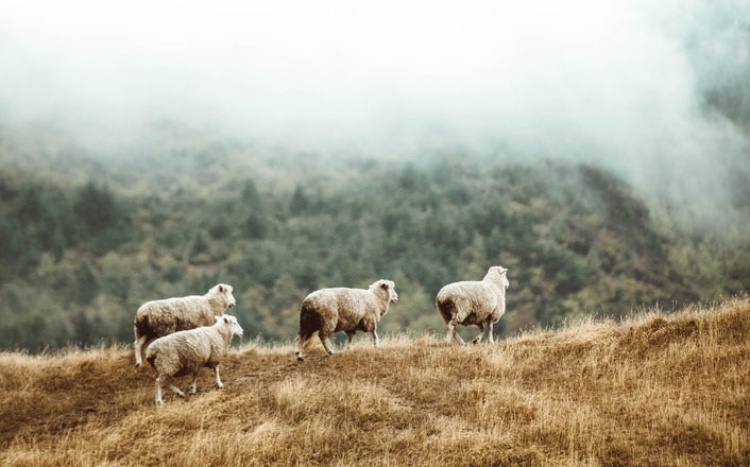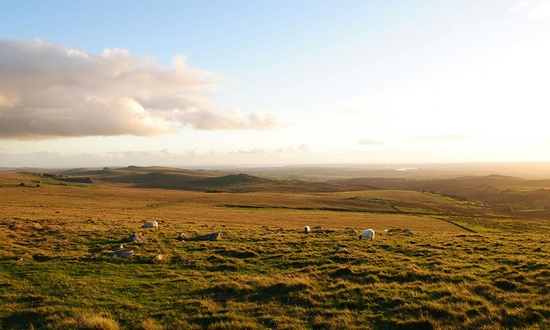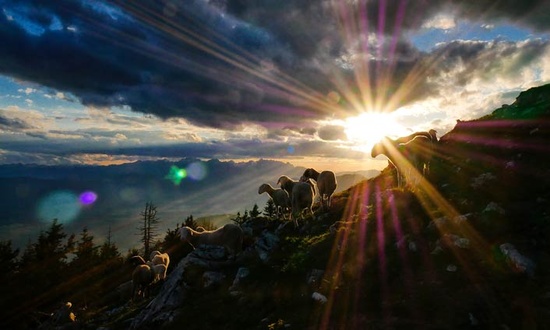Note from Randy: Jesus of Nazareth is the self-proclaimed “Good Shepherd.” The psalmist said, because of his Shepherd, “I lack nothing.” Even in the darkest valley he would “fear no evil”—his Shepherd was with him (Psalm 23). Jesus says that His sheep may find total security in Him.
But incredibly, Isaiah 53 relates the Messiah not to a shepherd but to a sheep. It’s a magnificent truth that the Creator, Owner, and Shepherd of the flock became a lowly sheep in order to surrender His life for the other sheep. When you are suffering and feel God’s silence, look at Christ, the lamb who is silent before the shearers. He shouts to us without opening His mouth: “Don’t you see the blood and bruises? Never doubt that I care for you.”
Tim Challies, one of my favorite writers, recently wrote some reflections about Psalm 23. He and his family have walked through a dark valley after the sudden death of their 20-year-old son Nick last year. Like many before him, he has found deep comfort in this psalm. (Three years ago, early in her cancer journey, Nanci wrote a prayer based on Psalm 23. After you read Tim’s article, I recommend you read it. Her words spoke to me, and I hope they speak to you too.)
The Song I Sing in the Darkness
By Tim Challies
No work of art is more beautiful, more valuable, more irreplaceable, than the twenty-third psalm. It has stood through the ages as a work of art more exquisite than The Night Watch, more faultless than Mona Lisa, more thought-provoking than Starry Night. The lines of the greatest poets cannot match its imagery, the words of the greatest theologians its profundity. Credentialed academics may wrestle with it, yet young children can understand it. It is read over cradles and cribs, over coffins and crypts, at births and deaths, at weddings and funerals. It is prayed in closets, sung in churches, and chanted in cathedrals.
This psalm dries more crying eyes, raises more drooping hands, and strengthens more weakened knees than any man or angel. It tends to every kind of wound and ministers to every kind of sorrow. To trade it for all the wealth of all the worlds would be the worst of bargains. I’d have rather penned the twenty-third psalm than written Hamlet, than painted Sunflowers, than sculpted The Thinker, for when Shakespeare’s play has been forgotten, when Van Gogh’s painting has faded, when Rodin’s sculpture has been destroyed, David’s song will remain. We impoverish ourselves if we do not read it, do not meditate upon it, and do not treasure it. We weaken ourselves if we do not drink deeply of it in our deepest sorrows.
David’s great psalm employs the simplest of images—that of a shepherd and his sheep—and assures of the greatest of truths—that God is forever present with His people. “The LORD is my shepherd” he says so simply, “I shall not want.” Because the LORD is his shepherd, this sheep can have confidence that he will never lack for any necessity, for the shepherd loves His flock and will faithfully attend to their every need. When they are tired He will make them lie down in green pastures, when they are thirsty He will lead them beside still waters, when they are downtrodden He will restore them, when they are lost or uncertain He will lead them in the right paths. The sheep can rest in peace under the shepherd’s watchful eye, they can be assured of every comfort under His tender care.
But sometimes fields go barren and springs run dry. And in such times the good shepherd knows just what to do, He knows He must lead His sheep to fresh pastures and to cool, still waters. Yet He also knows the way will be difficult, for these pastures and waters lie on the far side of a dark valley. So He calls His sheep to Himself and begins to lead them into the darkness, to lead them along an unfamiliar path.
And here, on the edge of uncertainty, sheep says to shepherd, “Even though I walk through the valley of the shadow of death, I will fear no evil, for you are with me.” Though the shepherd must lead His sheep into the darkness, lead them through an unknown valley, they will go, for He is with them. Their fears are soothed by His strength, their uncertainty by His presence. When enemies approach He will ward them off with His rod, when sheep stumble He will lift them with His staff. The shepherd who leads them in will lead them through and lead them out. And soon enough sheep and shepherd will emerge into the light on the far side of their darkness. And there again they will settle together for rest and refreshment. There again they will dwell in sweet peace.
What comfort there is in the knowledge that the shepherd who tends His sheep by still waters is the very same shepherd who tends them in the valley of darkness. The sheep do not foolishly blunder into that valley, they are not led there by wily wolves or chased there by hungry bears. They are led there by their loving shepherd, they enter there only according to His good plan and perfect purpose. They enter the valley only because it is for their benefit, only because the shepherd is leading them to something better beyond. They are never for a moment alone, for they are always following Him.
My shepherd has called me to walk a difficult path—a path of sorrow, a path of grief, a path stained by tears. The way is uncharted to me but familiar to Him, for He sees the end from the beginning, He has known from ancient times the things still undone. He speaks to the darkness and declares, “My counsel shall stand, and I will accomplish all my purpose.” I can have in him all the confidence of a sheep in His shepherd. I can follow Him, knowing that “surely goodness and mercy shall follow me all the days of my life, and I shall dwell in the house of the LORD forever.”
And I will follow Him, singing this song in the darkness, meditating upon its truths with every step. I’d rather face my trial with David’s psalm in my heart than with Aaron’s staff in my hand, with Joshua’s army at my side, with Solomon’s gold in my pocket. I’d rather know the words to this one song than of all the great hymns of the Christian faith. I’d rather lose everything with my shepherd beside me than gain the whole world alone. Yes, I can bear the loss of my son as long as I know the presence of my shepherd. I can walk this path, I can pass through this dark valley, if only my shepherd guides me, if only He leads the way.
This article originally appeared on Challies.com and is used with the author’s permission.
Photo by Taylor Brandon on Unsplash




